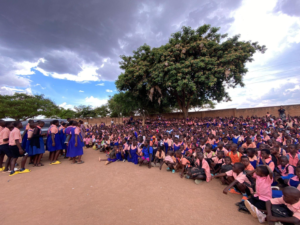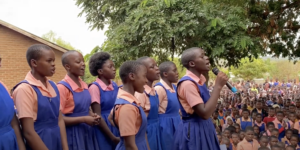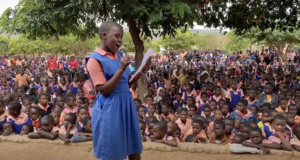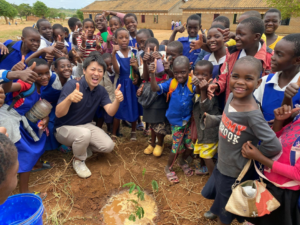Malawi is situated in southeastern Africa. With its wealth of knowledge in creating education programs using ICT, since around 2012 Colorbath has carried out web-based interaction projects linking classrooms around the world from its base in Malawi. In FY2020, we implemented a glocal ICT-based interaction program with the participation of students and teachers in Malawi which was selected as an EDU-Port certified project, and in FY2021, we carried out a pilot study on improving the school health environment in Malawi using ICT as an EDU-Port research project.
At the present time, we are attempting to use the time that would correspond to special activities in Japan to communicate the importance of healthy habits in Malawi elementary schools, such as hand-washing, gargling and vaccinations.
Schools in Malawi have thousands of students and it is not easy for the teachers to communicate information to every single student. Colorbath, therefore, aimed to create a versatile model in which students participate in school assemblies, club activities, student committees and so on and share what they have learned with other students. In addition, by sharing the project content through online interaction, the Japanese and Malawi students are getting to know each other better and are building a relationship of mutual learning.
In December 2022, Colorbath staff visited Malawi to carry out a pilot project at an elementary school in Mzimba, about six hours’ drive north of the capital, Lilongwe. First of all, we took part in a school assembly. As the school lacks the budget to hand print-outs to the students and not all homes have a mobile phone, information is communicated to the students at the school assembly.
A microphone and speaker were specially provided for our visit, but normally the 2,000 students are addressed naturally without any voice amplification. The teacher explained bit by bit, getting the students to shout out in unison and clap their hands. Colorbath staff were permitted to address the students, but the local teacher was more adept by far at getting the message across to the students and capturing their interest.

School assembly (Kaphuta Elementary School)
The following is an account of two student-led awareness-raising activities performed at the school assembly.
First was an activity by the chorus club. Student volunteers write parody songs to raise awareness of various issues. In Malawi, singing, dancing and rhythm are important elements of group management. Even noisy students have got into the habit of listening quietly and attentively to the chorus club songs. At the school assembly, the chorus club performed an original awareness-raising song about cholera prevention for which they had written the lyrics and music themselves. They adeptly communicated how to prevent cholera and the importance of hand-washing and gargling.
Moreover, Colorbath staff demonstrated a singing activity and showed how to make messages stick in the mind by getting the students to participate in the singing or dancing, instead of just listening. The idea of the students learning while participating seemed to be a new concept for the teachers.

The chorus club members performed an original song
The second activity was an awareness-raising activity by the drama club. The students performed a play which they had written themselves about the risks of infectious diseases and the importance of vaccinations. The performance was so realistic that it had a tremendous impact on the 2,000 students watching. They fully realized the importance of taking measures against viruses that they cannot see. It is important that students have fun learning and communicate what they have learnt to their parents.

A mike and speaker were specially budgeted for our visit.
In addition, the members of the beautification committee planted a young tree in the school grounds as an activity utilizing the time that would correspond to special activities in Japan. It was important that the activity was student-led, not adult-led, and that students across all grades interacted. After talking to the principal, roles were allocated so that the older students dug the hole while the younger students planted and watered the sapling.
Tree-planting has more value than meets the eye.
Trees prevent the roof of the school from being blown off by strong winds.
When the trees have grown, they can be cut down to make desks.
They also protect the school from flood damage.
Beautification committee activities and tree-planting activities are activities that bring the local community and the children together to make the school a safe place to learn.

Planting a tree with the students
Through web-based interaction, Malawi and Japanese students and teachers learned the essential points and educational effectiveness of each others’club and committee activities described above.
Online interaction consists mainly of three parts: self-introduction, action-based activities and question-based interaction.
First, the students become friends through simple exchanges such as “I am …” and “I like …”.
They bond by playing kendama, making paper helmets, etc.
And then they go on to tell each other about how they spend their day at school, what they like, the characteristics of their country, etc.
In the course of the online conversations, the students overcome language and distance barriers to express in their own words what they want to say and what they want to ask. The adults observing the process are also motivated by the out-of-the-ordinary event to brush up their everyday communication skills, and they become aware of the students’ ability to find the motivation to study and take a more proactive approach to health education.
Through the project, Colorbath was able to perform activities from hearing to verification and establish the program in collaboration with the Malawi Education Bureau. We were also able to create an interactive model not just for solving problems, but for Japan and Malawi to grow together through mutual communication, and to create the conditions for continued future interaction.
Going forward, we will pursue activities in close cooperation with local staff, members of the Education Bureau, students and Japanese educators.
▼Website for Colorbath web-based interaction program “DOTS”







